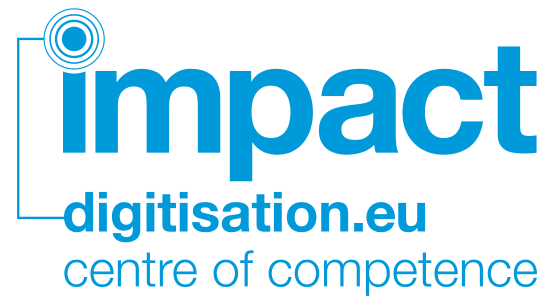A Research & Development project typically develops innovative solutions for problems in a certain domain and fosters the sharing of expertise within the project, as well as with the stakeholders in the field. The challenge is to sustain and further develop the results and to continue the sharing of expertise after project funding ends. The solution discussed in this white paper is the formation of Centres of Competence in different domains.
The idea of setting up Centres of Competence as a means to share expertise and to sustain project results came up in the context of building a framework for large scale digitisation and digital preservation of European cultural heritage. The concept was first discussed in a meeting of experts from member states and EC organised by the Directorate General for Information Society and Media (INFSO) in Luxemburg in 2006.
As a result, several currently running projects in the 7th Framework programme of the European commission (started 2008) were funded with building a (virtual) Centre of Competence as one of their objectives: IMPACT, 3D-COFORM,V.musT-NET, PRESTOPRIME and APARSEN. The results of the FP6 project PLANETS, finished in 2010, are already sustained in the Open Planets Foundation, an organisation that can also be characterized as a Centre of Competence.
Each of these projects is now in the process of setting up a Centre in their specific part of the domain, looking for the most feasible form and struggling with the same issues, e.g. financial, legal, human resources. At the end of 2010 the representatives of these projects reported on their progress in a concertation meeting. In this meeting it was decided to keep up this exhange of ideas and to start working on a document on Centres of Competence that could be of use to the EC in the decision making process for new funding programmes. Download the report here.
White paper
In this white paper we want to discuss challenges in setting up and sustaining a Centre of Competence, and share best practice with others who are either looking to set up such a Centre or have already (successfully) done so. We are keen for contributions of success stories, lessons learned, do”™s and don”™ts and we invite all who have experience to contribute.
The aim of this white paper on Centres of Competence is to inform and influence decision making in the preparation of the new FP8 Work Programme of the EC. Starting from the experiences we have in the Digital Library field, we would like to extend to other domains of research, as the sustainability of project results and the sharing of expertise are issues applicable to all sorts of R&D projects.
Content
- Projects currently involved with setting up or sustaining a Centre of Competence ““ brief overview. I propose we start with those present in the Luxemburg meeting in December 2010. Focus on:
- project objectives
- proposed exploitation and use of results
- sustaining the unique expertise of the project
- enabling and stimulating further research
- the concept of the Centre of Competence for this particular project
- Best practice in forming a CoC:
- engaging the partners in the current consortium
- defining the clients
- defining value
- finding a business model
- governance issues and solutions
- working with the end in view
- lessons learned
- is there an ideal form for the Centre?
- Centres of Competence: synergies
- sharing resources/merging efforts
- a Centre of Competence for Centres of competence? Benefits of producing guidelines/forming a virtual community around this
- Call for comments, ideas, and more best practice examples
Next steps
We will work on this paper in an iterative and collaborative way, with a group of people who are involved in setting up such Centres in the field of digital libraries. The range of those contributing could be broad, from the researchers into imaging, sound recording, computer science to the actual digitisation and digital preservation professionals and managers who work in this field. A good start for this would be the group that convened in Luxemburg at the meeting that the EC INFSO unit organised in December 2010.
I propose to proceed as follows:
- we start with the outline of the white paper (see Content) and all those interested can claim parts of it to write (I will also take on some chunks of course!) we can all comment and change each others”™ work
- we start with those directly involved as contributors, i.e. the “˜ invited to Luxemburg December 2010 “˜ group.
- the site will be open for posts and comments to everyone in the field, but only the contributors can edit the page
- the first draft will be discussed with the INFSO unit by the contributors
- after comments and revisions the paper will be published through available channels
- dependent on reactions we might keep this site alive for the community of managers and members of Centres of Competence in the digital library field. We might even consider to extend this to other fields
